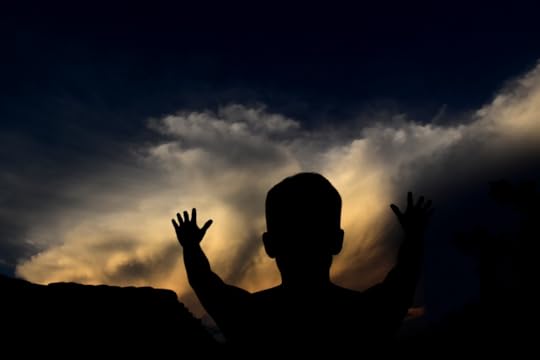Randy Petrick's Blog, page 4
May 20, 2023
WASHING GOD'S LAUNDRY

Have you ever used the YouVersion Bible app? It is an amazing resource and I especially enjoy the Bible Plans it has – series of daily devotionals on just about any topic you can imagine, presented by hundreds of different individuals and groups. I was reading in one of those series recently and came across this remarkable paragraph:
We serve a King who isn’t safe, but He’s good. When we pray, our prayers shouldn’t be safe; they should be good, big, and dangerous like God. We tend to come to God with our dirty laundry, or our laundry list of what He can do for us. What if we came asking what we could do for Him? That’d be dangerous. –Life.Church
Wow! So many of us (me included) come to God with our laundry lists of what He can do for us. What if we were to reverse our prayers and ask God, “Who’s laundry can we help You wash? Whose prayers can we help you answer?”
DESPERATE PRAYERSThere are people in our world sending desperate prayers to God. Have you ever been one yourself? God uses those experiences to develop compassion in us and love toward others going through their own desperate times. Personal experiences change the way we think about and respond to the world around us.
“Don’t copy the behavior and customs of this world, but let God transform you into a new person by changing the way you think. Then you will learn to know God’s will for you, which is good and pleasing and perfect.” (Romans 12:2 NLT)
God’s will for each of us will be different but some things are true for all of us. One of those things is our responsibility to help others as we are able.
“Do not withhold good from those who deserve it when it’s in your power to help them. If you can help your neighbor now, don’t say, “Come back tomorrow, and then I’ll help you.”” (Proverbs 3:27-28 NLT)
I believe God has always wanted me to attempt greater things and to be even more active in His world than I have been. (For example, I bought the rights to this web domain name 15 years ago (!), but it has just been parked unused until now.) Why haven’t I attempted greater things? I’ve been fearful, I’ve felt inadequate, I’ve worried about failure, and I’ve felt like I lacked the needed financial resources. I hope my stories will encourage you to step into your destiny a lot sooner than I did.
OVERCOMING FEARS
For today, let’s talk about fear. I was one of those kids who couldn’t sleep in a completely dark room. There always had to be a nightlight in my room. That fear lessened as I grew up, but I had plenty of other fears as an adult. Thankfully, Robert Morris, in his book Beyond Blessed (link at end of blog), helped liberate me from many of my adult-onset fears.
Here’s a paragraph from the book to help you see what I mean:
In dramatic contrast, putting God first and recognizing that it all belongs to Him liberates us from fear of loss and insufficiency. Think about it. When you own a home, the repairs and upkeep are solely your responsibility. But when you are a tenant, the ultimate responsibility for the property lies with the landlord. Homeowners may lie awake at night worrying about whether the roof needs to be replaced, but tenants never do. If there is a potential problem, they simply pick up the phone and say, “Hey I think you may have a problem with your roof. You might want to check it out.”
[Here's me with my mind blown. What a life-changing concept this is!]

I sleep better knowing I'm not the Owner.
THE SECRET IS NOT OUT THERE...Pastor Jeremy of Time of Grace Ministry wrote the following:
Go and serve your friends and families. Slave away for the benefit of your spouse and your children. Fill the lives of others with good things, by giving, and giving, and giving, and giving, and recognizing that really the secret to fixing our broken communities, the secret to healing broken families, the secret to binding broken hearts — it’s not out there somewhere — the secret is you.
Words like these really helped me when God recently prompted me to start a website and to start blogging. “Hey,” I said to God, “I’m almost 70 years old! This is a young person’s gig. What I know about how to build a website or write a blog is exactly ZERO!”
“Go ahead anyway,” God seemed to say back to me. “I will see that you get the help and resources you need as you need them. Tell your stories. Reflect My glory. Every day there are millions of people whispering desperate prayers. I desire the hearts and hands of willing workers to help answer them. You can be one. In Me, you are sufficient. Remember, I can do abundantly more than you could ever ask or imagine.”
So, here I am. Just blogging away. Amazing. If I can start a project like this within months of being a septuagenarian, and make myself available to God for laundry duty, so can you. Stop with the “I’m not good enough” excuse I used for so many years. Whatever task God has put in front of you, get on with it! You ARE good enough. God has made you so via the cross.

There’s a lot of “laundry” out there, friends. I pray with all my heart that you will join me in asking God which desperate prayers you can answer. Once He shows you, don’t let your fears stop you from your tasks like I did. Reach up and grab God’s hand. It might have a bit of soap on it, but He already has it stretched out to you… just waiting for your help with His laundry.
-------------------
May 9, 2023
THEY KEPT TELLING ME TO GO SIT MY "DONKEY" OUT IN THE HALL
"Use what talents you possess: The woods would be very silent if no birds sang there except those that sang best." –Henry van Dyke

Have you ever listened to an orchestra tuning up before a concert? I always wondered why it is nearly always an oboe that starts the tuning process, so I recently turned to a Google search to see what I could find out.
One explanation I found said that the penetrating sound of the oboe stands out from the orchestra, so it’s easy for all the musicians to hear. Fair enough. Oh, and its pitch is also steadier than strings such as those of a violin. This was especially true, apparently, back when all violin strings were made from gut. (Yikes.) These days, I learned, those violin strings are more often made from steel. Steel? Huh. I had no idea.
Most other instruments are somewhat unstable in pitch because of the way heat, humidity, and other conditions affect them. But such is not the case with our dear friend oboe. Yamaha.com says, “It is difficult to adjust the pitch of an oboe. Therefore, the other instruments in performance must be made to match, and that is why the oboe is the standard for tuning.”
The next site I visited was oboefiles.com. Here I found an interesting bit about the “etiquette” involved with orchestral tuning: “Tune quickly and purposefully; then wait patiently and quietly.” Additional etiquette provided there included these words to the wise: “Nobody likes the person who uses tuning time…to test how loud or high they can play. Wind players: Play your A at a mezzo-forte dynamic and adjust slightly if needed.”

Gosh, I sure could have used that knowledge back in second grade music class! I could have avoided the “hours” of agony that ensued after I tested how loudly I could sing a solo when our classroom was otherwise relatively silent for a moment. I may have started my solo at mezzo-forte, but I adjusted greatly and was thereupon escorted out of the classroom with an admonishment to the effect of “You can just sit your [another word for donkey] out here in the hall until music class is over for today!”
I digress. Anyway, the final point I learned about orchestras is that they always tune to 'A' because every string instrument has an 'A' string. But wait. Not just any 'A' will do, though! And this is where the explanations started getting a little over my head. As best I understand it, large quantities of rental cars also got into the picture back in the early days. The only way I figured that one out is because several articles I read agreed that the standard pitch is A=440 Hertz.
But what would happen, I wondered, if the oboe in question decided to use Alamo or Budget instead of Hertz? Would that cause the entire orchestra to be out of proper tune? And why not just let each orchestra member use an electronic tuner ahead of time? Wouldn’t that be more efficient? “Well sure,” I can hear you saying, “but that would take away from the enormous pleasure the audience takes from listening to all the cacophony during tuning.”
All right. If you say so. But if the audience is getting such “pleasure” from cacophony, why don’t we increase their pleasure quotient by letting four or five different oboes all play “A” at the same time during tuning? Can you just imagine the audience delight ensuing from each orchestra member trying to decide which oboe to tune to? Ha! [Sorry. I’ll take my donkey out in the hall on my own. You won't need to assist me.]

Enough meandering. I really do have a reason for all these oboes, the Hertz corporation, and the donkey business. And my reason is birds. I was sitting out on my patio recently and happened to hear a bird repetitively chirping the same single note over and over. [A Northern Flicker, I think, but I’m a neophyte on this bird stuff.] “You go, little buddy,” I said. “You may only know one note, but you are putting everything you’ve got into it. Bravo!”
Pretty soon, I noticed lots of multi-noted birds joining in with my little friend. And, suddenly, I remembered the whole oboe business. I’ll be darned. My one-note buddy may have been the “oboe” of the entire bird orchestra. Wow! Here I had been almost feeling sorry for a bird that had only one note to sing…until I realized his or her one little note may have been the key to the entire winged symphony that took place in my yard.
Are you sensing where I’m heading here? God has designed us all with specific purposes in mind, and we each need to play our parts in His symphony. If you’ve been feeling “sorry” that your part is so “insignificant” compared to everyone else, fret no more. You may be “singing” only a single note, but your note may be like the oboe’s note or the Flicker’s note. God’s entire orchestra would never be able to successfully perform His symphony were it not for the single note they each tune to. That single note could be you.
WE ARE ALL PARTS OF THE BODY OF CHRIST1 Corinthians 12:17-22 says,
If the whole body were an eye, how could it hear? If the whole body were an ear, how could it smell? God has placed each part in the body just as he wanted it to be. If all the parts were the same, how could there be a body? As it is, there are many parts. But there is only one body.
The eye can’t say to the hand, “I don’t need you!” The head can’t say to the feet, “I don’t need you!” In fact, it is just the opposite. The parts of the body that seem to be weaker are the ones we can’t do without.
Be joyful and celebrate your role in the Body of Christ whether you feel it is great or small. Remember the importance of the oboe, celebrate the Flickers, and if you run into any donkeys, just visualize me sitting out in the hall. [Ouch. That Hertz.]
April 26, 2023
LET THE RIVERS RUN!
 Hindsight Proved I Was Pathetic
Hindsight Proved I Was PatheticHave you ever studied the topic of stewardship? I really hadn’t done so until recently. Pathetically, in hindsight, I wasn’t sure I really needed to! (Wow.) After all, I already understood that stewardship had to do with things like money management, investing well, reducing debt, and giving. Likely, you are far ahead of my limited view and realize that stewardship has a much broader meaning and should also include topics such as environmental protection, property upkeep, social responsibility, energy conservation and more. Once I started studying stewardship, those were things I finally understood.
In addition, my study broadened my thoughts about the recipients of Christian stewardship. In the past, when I thought about who to help, widows and orphans generally came to my mind. I knew the Bible was clear on those two groups. Now I have a broader mental list that also includes groups such as people who live with a disability, people with very limited resources, and people who have been abused or neglected. I’ve also realized that stewardship extends far beyond just money. It can even encompass topics like clutter reduction, frugality, and living a life of greater simplicity.

A more holistic view also recognizes that in some cases, money isn’t even part of the equation at all! Perhaps a simple sharing of the gospel may be our proper stewardship. Truly, God has placed a great deal more under our care than my prior narrow view encompassed. Following are four things I learned that caused me to stop and re-evaluate my stewardship. Maybe they will cause you to reflect as well.
Acknowledging The OwnerFirst, I was reminded that the Bible doesn’t mess around when it comes to addressing the true owner of all we have been called to steward. The very first chapter in the Bible (Genesis 1) lays it out quite clearly that God is the creator and owner, and has dominion over all things seen and unseen, beginning with this statement in verse 1:
In the beginning God (Elohim) created [by forming from nothing] the heavens and the earth. Genesis 1:1 Amplified Version (AMP)
I’d say that’s all encompassing. Genesis chapter one also addresses our roles as stewards:
Then God said, “Let Us (Father, Son, Holy Spirit) make man in Our image, according to Our likeness [not physical, but a spiritual personality and moral likeness]; and let them have complete authority over the fish of the sea, the birds of the air, the cattle, and over the entire earth, and over everything that creeps and crawls on the earth.” –Genesis 1:26 (AMP)

While we have developed scientifically and technologically to a place where we are able to produce artificial light in greenhouses, draw nourishing water from deep in the earth, and isolate nutrients that can be added as fertilizer to enhance plant growth, we will never be masters of the design or forces that cause seeds to grow and become fruitful to begin with. We’re tasked with stewardship, but true ownership will never be ours.
Let the Rivers Run (Our Life-Enhancing Role)Second, my study caused me to intellectually revisit the wide freedoms God has given us. As delineated above, humans have broadly been given authorization to oversee the care for God’s creation. That’s basic, right? And I will ashamedly admit that that’s about as far as my thought process went until the day someone asked me a question that stopped me in my tracks: “If we are truly stewards of God’s creation, how do you think we are doing in that role?” (It didn’t take much thought before I hung my head. My body language was my answer.)
Bible Studies professor Eugene F. Roop makes the interesting and true observation that we are all genuinely free in God’s created world: “We have the power to drain the farm soil of all its nutrients, to enslave certain people by economic oppression or military might, to care for only our own physical needs or emotional desires. We can even preach the gospel as benefitting and blessing us and condemning those not like us.” [Dang. There is some uncomfortable truth in those sentences.]
Thankfully, Roop ended his observations in a far more optimistic place – a place I hope we can collectively approach: “We can rejoice that stewards are finding new ways to nurture the soil back to life. Many stewards are reclaiming their life enhancing role… [They] are listening to nature’s voice and deciding to let the rivers run.” Amen to that.
Thoughtful Allocation
Third, I’ve realized that as we broaden our perspectives on stewardship to include issues dealing with all of creation, all of humanity, and all the things God has provided, our roles as stewards become significantly more challenging. As difficult as it is to earn money to start with, it is even more difficult to learn to steward our resources wisely.

As social philosopher Michael Novak says, “To shovel it out the door is easy; to produce the desired effects and to choose the right hands to put it in are two far more difficult tasks…. [A] balanced and thoughtful allocation of whatever resources are available is at least as significant as the amount in the pot.”
Impacting Eternity
My prayer is that I (we) can learn to think and act from an ever-broader sense of mission and purpose. Wouldn’t it be great to see Christians all over the world reclaiming the life enhancing roles God has always intended for His stewards?
Ruminating on that question led me to my fourth activity-changing conclusion: Our roles as stewards extend beyond just stewardship of the earth. Our most important roles are to steward our time, money, and talents to sow seeds “for the harvest that is to come.” We can (and should) be stewarding our talents and abilities to impact eternity! May God help us do exactly that.



